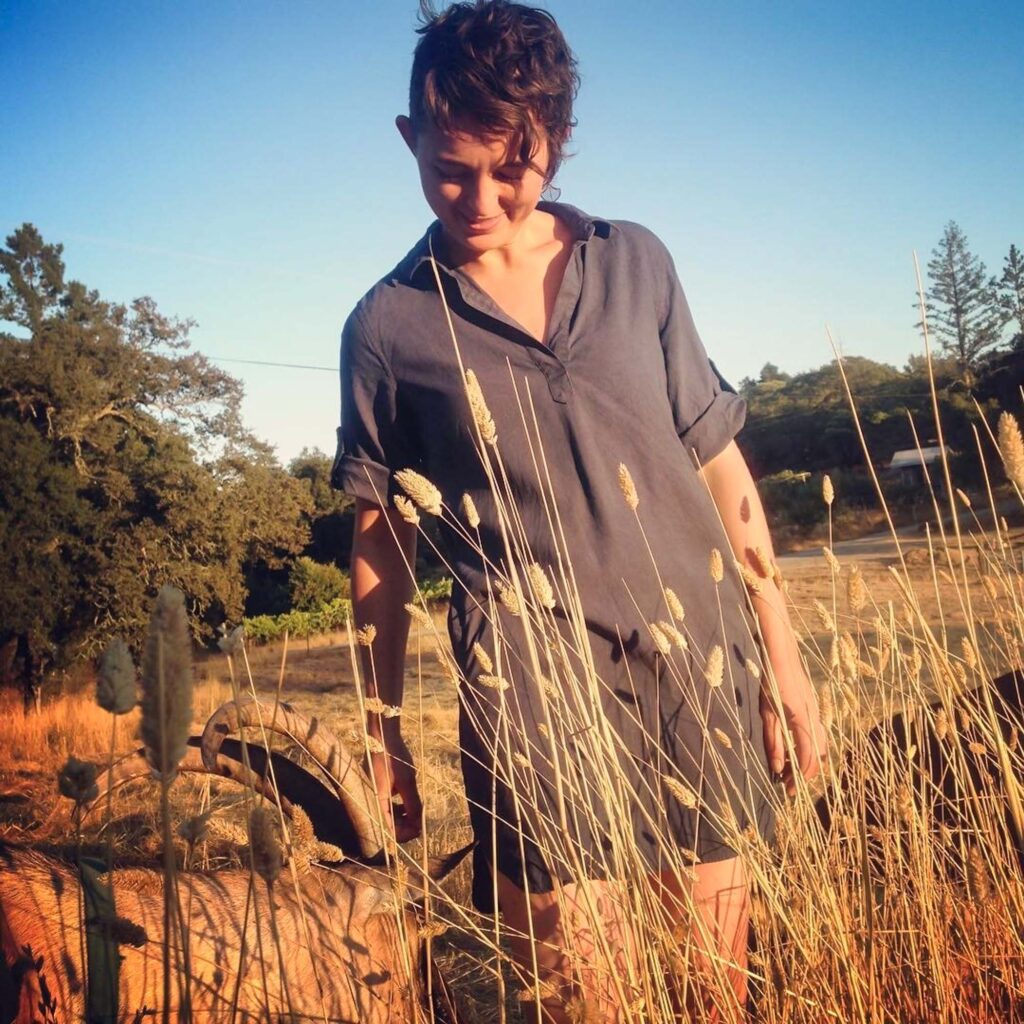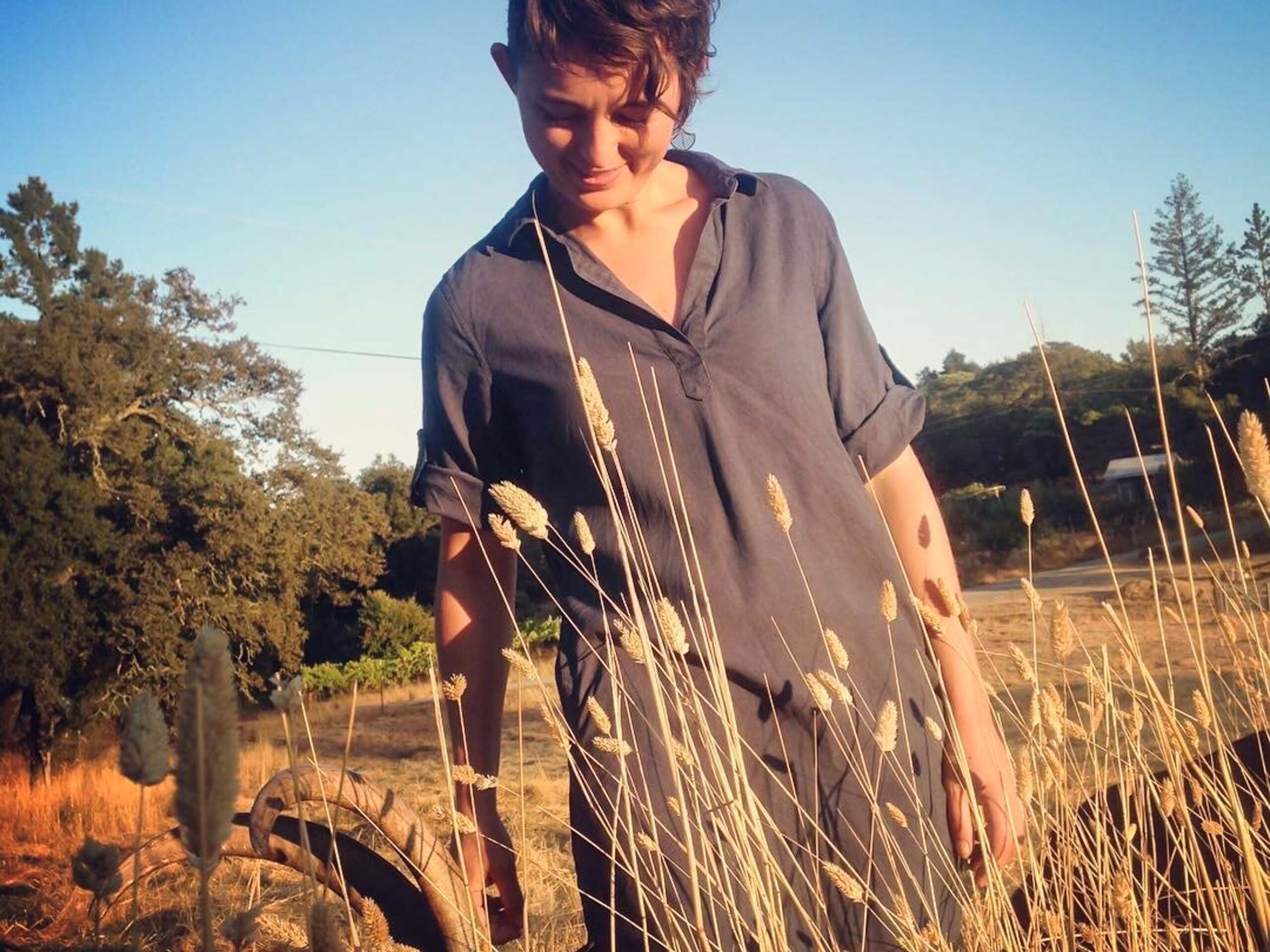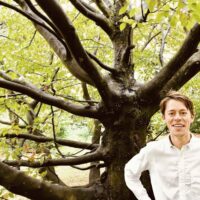Laura Scappaticci spoke with speaker, writer, and land steward Thea Maria Carlson about the intersecting connection of our relationship to the Earth and each other. With her lens of social justice, Thea offers a critical look at the tension between positive pictures of the future and the real challenges before us.
Scappaticci What is your most recent work related to biodynamic agriculture, climate change, and social justice?
Carlson I’ve been doing a deep dive into climate and our relationship to the Earth for a long time, but especially the past year and a half since I experienced wildfire. So that’s kind of a lens that I’m often seeing things through because I’m surrounded by burnt trees, and the ghosts of buildings that used to be here that aren’t anymore.
And I think what I’m taking from my experience with biodynamics is really: What is our relationship with the Earth? How do we relate to the Earth? What is this relationship for people, especially European descended people who settled on this continent? How have they experienced a deep separation from the Earth and out of that separation seeded the climate chaos that is now upon us?
So I am working to shift my own relationship and also support others in shifting their relationship to the Earth. Which I have been doing for a long time through food and farming, but now also looking at a broader landscape level of forests and climate and fire and how we come into a positive relationship with all of the elements, including fire, so that we can work with them to bring balance instead of having an oppositional relationship that then leads to these bigger crises.
What are some hopeful pictures that you see emerging in your work and in the world?
I think one of the most hopeful things that I’m seeing is the emergence of collectives led by Black Indigenous People of Color (BIPOC) who are stewarding land in really holistic ways that also incorporate human healing.
There’s an example here near me, Shelterwood Collective, but similar collectives seem to be popping up all over the place. And one of the things that I’m involved with now is working on land access for farmers and land stewards through Agrarian Trust. And in that work, we are prioritizing land access for BIPOC farmers and land stewards. It’s just really inspiring. I think I’m seeing a big shift— in what I’m aware of anyway— compared to when I first got into agriculture 20 years ago. Back then I was thinking: «Okay, we’re going to grow plants organically or biodynamically or we’re going to grow a bunch of food to feed the community.» But that was a pretty narrow perspective. I’m seeing all these initiatives coming up now that are really healing the deep, spiritual, emotional wounds of systemic oppression, as well as mistreatment of the Earth, and bringing those two things together in really beautiful and creative ways.
That is a really hopeful picture. What is your connection to anthroposophy, both personally and in your work?
I have always had, I would say, an ambivalent relationship with anthroposophy. And I think that has a lot to do with an experience of this kind of intellectualizing or headiness that I’ve consistently encountered in anthroposophical circles. That for me is hard to experience as embodied. And so it’s been a long, ongoing journey to find how the insights that are in anthroposophy can live in me and in an integrated way.

Embodied anthroposophy
Often times I have difficulty in being in explicitly anthroposophical contexts, even though I feel like there are a lot of ways of understanding the world that are super valuable that come out of anthroposophy. For me I have to live into them in my own way for them to really be meaningful.
What’s most important is that there is a genuine interest in the other, which I know Rudolf Steiner talked about. And not coming from a place of ‹I have this amazing insight and I want to enlighten you›, but more ‹What can I learn? How can I connect? Where are there commonalities and differences between me and another person or another community or a landscape?›
And I think it’s much more powerful when we’re actually living our understanding rather than just talking about it. And I think that’s much more difficult than saying ‹Oh, I read this, or here’s this philosophy that I’ve internalized.›
What really resonates and has pulled me in is when people are just acting from a different place. And I can sense an intangible quality to how they’re acting that draws me to them, which is similar to how I got into biodynamics. When I first read the agriculture course, it didn’t make any sense to me. Then being on biodynamic farms and feeling the life force on the farms was what drew me in. And I think there’s a similar way that people can live into what’s possible, rather than just talking about it.
If you were going to ask people to do something on behalf of the Earth and on behalf of community, what would you ask them to do?
I think for me it’s always a two part question: What can I do? And how can I support other people who are doing really amazing things that I’m not going to do, but that I can see the power of? And I think that’s especially important in a society that is characterized by so much disparity and systemic oppression. That as someone who is racialized as white, I have access to power and privilege and financial resources and other resources that other folks have been denied because of the body they’re born into.
And it’s important for me to find the work that is mine to do and also to use the privilege and power that I have to make it more possible for other people to do the work that is theirs to do, whether that’s making a donation or making connections to people who can be helpful.
True Service
And of course, in that helping or supporting other people, there’s a really important internal path that I am constantly walking where I ask ‹What is the place I’m coming from here?› It’s really easy for white people to try act from a place of internalized superiority or saviorism. This idea that ‹Well, I have it better than these people, so I need to help these poor people.› doesn’t serve anyone. There are so many transformative initiatives that are being started and led by those who have been most harmed by the systems of oppression, initiatives that have the greatest potential to heal communities and the Earth. I’m trying to come from a place of ‹Wow, look at this amazing work that’s being done. How can I add a little more fuel to the fire that they already have?›
Is there anything else that you think is really important for humans to be exploring right now?
I think one of the things that I’ve been spending a lot of time with, and I imagine that it will constantly be something that I’m kind of trying to create space for, is really sitting with and taking in the depth of crisis that we’re in globally. I think the pandemic has probably brought everyone to a greater level of awareness around that. And things like wildfires and other climate-fueled disasters also have, along with all the violence that is happening in the world. I think having the land that I steward be so severely burned in wildfire, made it so I couldn’t turn away from it anymore, or just stay in the ‹hope.› I think hope is really important, but also the grief and the reckoning with reality is really important to ground us. And that takes time and space and willingness to be in discomfort. And I think that’s really necessary for us to actually shift our relationship and understand the changes that we need to make in our lives to create positive change for the future.
More Thea Maria Carlson





